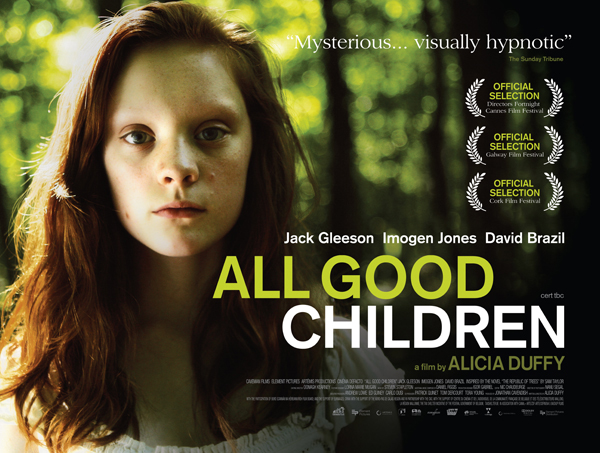
The opening scenes of Sam
Peckinpah’s The Wild Bunch and Straw Dogs show cruel children
torturing animals, Peckinpah’s point being that the ability to carry out
violent actions is something innate in humanity and present even in children. A
range of paedophobic horror films, particularly The Innocents, represent
the loss of a child’s innocence as a frightening and psychotic experience.
Puberty and a burgeoning attraction to the opposite sex is often represented in
cinema as a challenging and sometimes murderous time – Heavenly Creatures,
The Scouting Book For Boys, this year’s The Sea. All Good
Children is pretty much a heterosexual version of Heavenly Creatures –
aside from some slight differences – and it adds very little.
Dara and Eoin (Jack Gleeson and David
Brazil) move to France following the apparent suicide of their mother to live
with their aunt Valerie (Laura Persain). Dara soon comes across an English
family who live not far away and almost immediately falls under the spell of
Bella (Imogen Jones), the young daughter of Julian and Lynne (David Wilmot and
Kate Duchêne). They have a brief and idyllic summer romance. When their
relationship becomes too aggressive, they are forced apart and Dara is not able
to adjust to life without Bella.
Writer-director Alicia Duffy has
a fondness for moody arthouse aesthetics and the entire film has been made with
that slightly distanced, elliptical tone that has become so familiar now in art
films about love and sex. There is probably a bit of a Haneke influence, though
without the thematic and intellectual rigour of, say, Benny’s Video –
Haneke’s own killer kid film. The early scenes of Dara and Bella’s flourishing
relationship are all bright sunshine and Malickian sequences of running through
grass and dancing barefoot in forests, though played less for romance since it
is unmistakably telegraphed that things will soon turn sinister. By the time a
heartbroken Dara begins his transition from innocent kid to nut job, the colour
scheme has become muted. Though the distanced camerawork remains throughout, we
now see dark cave-like dwellings and rotting animals instead of big, open
spaces and sunlight.
The film is both dated and redundant – with a very
Freudian view of the romance (and a scene involving blood that recalls Andrea
Arnold’s films, particularly both Fish Tank and Wuthering Heights)
and a storyline that recalls too many other ‘love is confusing for children and
might even be dangerous’ films as well as her own short film The Most
Beautiful Man in the World.
The performances from the children are quite good, though
Imogen Jones suffers from a necessarily underwritten part as the unknowable
object of Dara’s attraction. Jack Gleeson (soon to become infamous for playing
King Joffrey in the overrated Game of Thrones series) is very good and holds
the film together better than the script or the direction. The parents are all
practically silent – see also, again, The Most Beautiful Man in the World.
Presumably, Duffy is making the point that parents are becoming more detached
from their children and that the unfortunate events in All Good Children are
due as much to neglect as puberty. As a result, David Wilmot, as well as
Persain and Duchêne, is left with little else to do but offer a restrained,
quiet performance and is rather forgettable as a result. Apart from Dara, no
one in the film seems to be particularly human.
Just like Duffy’s 2002 short The Most Beautiful Man
in the World, All Good Children is a film about the difficulties of
growing up, particularly in terms of experiencing emotions that one cannot
understand, but it is so distanced and humourless and so self-consciously
minimalist and arty that it never really makes you want to care. And by the
time Dara goes on his violent rampage towards the end of the film, it feels
merely unbelievable. As a feature film debut, it is well put together but it
doesn’t seem, on this evidence, that Alicia Duffy has a particularly original
voice.
No comments:
Post a Comment